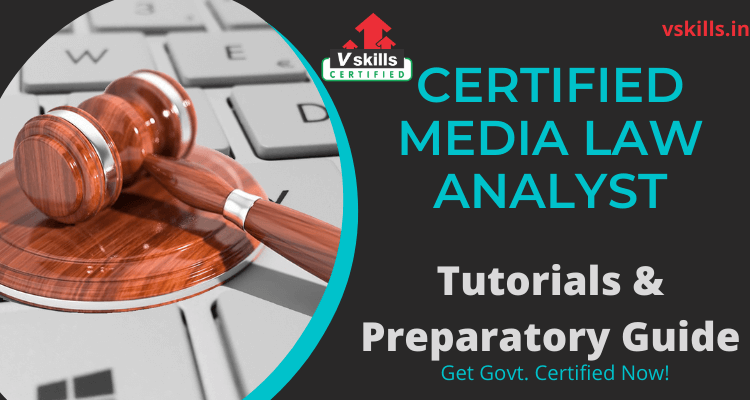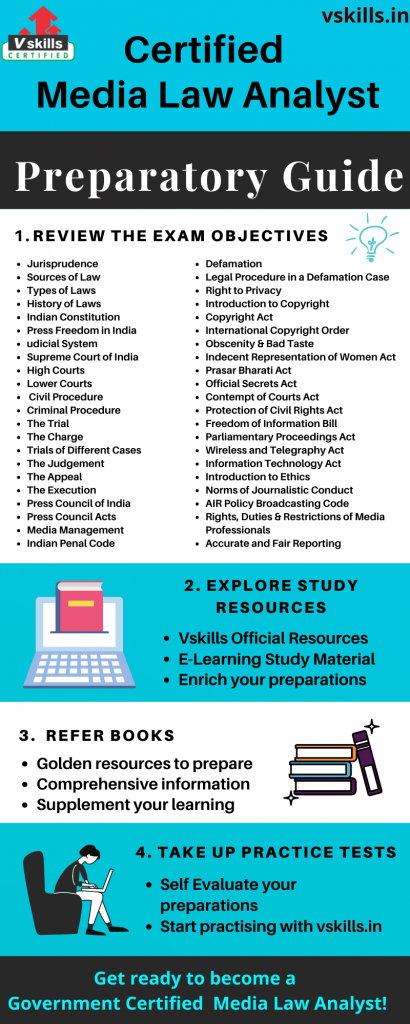
Do you have the aspirations to become a Media Law Analyst? Looking for the right tools to become a certified professional? Then you’ve come to the right place. A Certified Media Law Analyst perform various important functions in their organisation . Media law governs what can be published and broadcasted. Given the era of media upsurge, imposing legal checks and bounds on communication becomes extremely necessary This certification helps you further your career progress and widen your opportunities
Roles and Responsibilities of a Certified Media Law Analyst
Certified Media Law Analyst are great communicators as they advise their clients about various types of law that impact the media including trademarks, copyrights, employment law and dispute resolution. Their responsibilities range from complying with government regulations to negotiating agreements. They give advice and draft statements of case and skeleton arguments. Moreover, they appear in court and work on urgent applications for injunctions. They apply their skill set to represent the best interests of their clients.
Vskills Certified Media Law Analyst Overview
Vskills certification for Certified Media Law Analyst validates your knowledge as per the company’s need for compliance to media laws. his certification will test you on various areas like Centre-State Policy, Freedom of Media, Defamation, Official Secrets Act 1923, Contempt of Courts Act 1971, Intellectual, Property Rights, MRTPC Act 1969, Cinematograph Act 1952, Broadcasting laws, Advertising Standards Council of India and Media Ethics. Vskills Certified Media Law Analysts will find employment in companies specializing in media or legal services. Various public and private companies also need Media Law Analysts for their legal departments.
Why become a Vskills Certified Media Law Analyst
In today’s highly competitive environment, certification differentiates you as a professional who is serious about applied learning, making you an asset to a prospective employer. Earning a professional certification can open the door to increased visibility, better opportunities and new jobs in your industry. Becoming a Vskills Certified Media Law Analyst will help you climb up your professional ladder. As, the media landscape is constantly changing, the law that goes along with it is continuously being adapted too. Therefore the demand for Vskills Certified Media Law Analyst is rising. Vskills Certified Media Law Candidates are employes by Top MNC’s and organisations like KPMG, PwC, Deloitte, Fox Mandal, DSK Legal.
Vskills is India’s largest certification provider and gives candidates access to top exams as well as offers after exam benefits. This includes:
- Firstly, a Government verification tag
- This certification will have a Government verification tag.
- Also, the Certification will have lifetime validity.
- Further, you will get Lifelong e-learning access.
- Moreover, you get access to Free Practice Tests.
- Additionally, You will get tagged as ‘Vskills Certified’ On Monsterindia.com and ‘Vskills Certified’ On Shine.com.
Exam Details
- Exam Code: VS-1162
- Duration: 60 minutes
- No. of questions: 50
- Maximum marks: 50
- Passing marks: 25 (50%).
- There is NO negative marking
- This is an Online exam
Exam Process

Course Outline: Certified Media Law Analyst
This exam covers the following topics:
Jurisprudence
Sources of Law
Types of Laws
History of Laws
Indian Constitution
Press Freedom in India
Structure of Judicial System
Supreme Court of India
High Courts
Lower Courts
Introduction: Civil Procedure
Introduction: Criminal Procedure
The Trial
The Charge
Trials of Different Cases
The Judgement
The Appeal
The Execution
Press Council of India
Press Council Acts
Press Council & Media Management
Introduction: Indian Penal Code
Defamation
Legal Procedure in a Defamation Case
Right to Privacy
Introduction to Copyright
Copyright Act – 1957
International Copyright Order – 1999
Obscenity & Bad Taste
Indecent Representation of Women Act – 1986
Prasar Bharati Act – 1990
Official Secrets Act – 1923
Contempt of Courts Act – 1971
Protection of Civil Rights Act – 1955
Freedom of Information Bill
Parliamentary Proceedings Act – 1977
Wireless and Telegraphy Act
Information Technology Act – 2000
Introduction to Ethics
Press Council: Norms of Journalistic Conduct
AIR Policy Broadcasting Code
Rights, Duties & Restrictions of Media Professionals
Accurate and Fair Reporting
Preparation Guide: Certified Media Law Analyst

This much valued credential makes your academic records shine. Moreover, preparing for the same is not that easy. Access to the right tools and resources can help you prepare effectively. Here we provide you with the step by step preparatory guide to smoothen your journey for this exam
Step 1- Start with the exam objectives
Before heading towards your preparation journey, you must get yourself familiar with the main objectives of the exam. A thorough analysis will let you align yourself more deeply with the chief objectives if the exam. And hence, enabling you to gain the required command to earn your desired certification. This exam covers the following topics:
- Jurisprudence
- Sources of Law
- Types of Laws
- History of Laws
- Indian Constitution
- Press Freedom in India
- Structure of Judicial System
- Supreme Court of India
- High Courts
- Lower Courts
- Introduction: Civil Procedure
- Introduction: Criminal Procedure
- The Trial
- The Charge
- Trials of Different Cases
- The Judgement
- The Appeal
- The Execution
- Press Council of India
- Press Council Acts
- Press Council & Media Management
- Introduction: Indian Penal Code
- Defamation
- Legal Procedure in a Defamation Case
- Right to Privacy
- Introduction to Copyright
- Copyright Act – 1957
- International Copyright Order – 1999
- Obscenity & Bad Taste
- Indecent Representation of Women Act – 1986
- Prasar Bharati Act – 1990
- Official Secrets Act – 1923
- Contempt of Courts Act – 1971
- Protection of Civil Rights Act – 1955
- Freedom of Information Bill
- Parliamentary Proceedings Act – 1977
- Wireless and Telegraphy Act
- Information Technology Act – 2000
- Introduction to Ethics
- Press Council: Norms of Journalistic Conduct
- AIR Policy Broadcasting Code
- Rights, Duties & Restrictions of Media Professionals
- Accurate and Fair Reporting
Step 2- Choose your resources wisely!
Passing the exam can be easy if you have access to the right set of resources. Make sure the content is precise and reliable enough. The resources that you’ll pick will determine how well you prepare and pass the exam. Hence, you need to be very careful while choosing the preparatory resources. Vskills offers its own E-Learning and Study Material to help you prepare for this certification exam. These resources have lifelong access and are updated regularly. Also, they provide you with latest information and help you broaden your knowledge horizon.
Refer: Vskills Certified Media Law Analyst Sample Chapter
Step 3- Books to your rescue


Preparations for an exam are incomplete without books. Books have been a golden resource to prepare for this exam. They help in understanding the exam concepts by providing in depth explanations. Moreover, they offer real life business examples to provide better clarity. You should definitely include the following books to supplement your learning process:
- Media Law in India by Kiran Prasad
- Media Law and Ethics by M Neelamalar
- Law & Media by Rattan Singh & Shruti Bedi
- The Journalist’s Guide to Media Law by Mark Pearson
Step 4- Attempt Practice Tests
Regardless of how you prepare for the exam, a practice test always helps you evaluate your preparations. These practice tests help you diversify your study strategy and ensure the best possible results. Analyzing your answers will help you identify the areas where you need to give special attention to, and will also let you know your alignment with the exam objectives. Moreover, the best way to start doing practice tests is after completing the syllabus. Solving Practice tests can provide you with the confidence you need to be stress-free. Start Practising Now!
Job Interview Questions
Prepare for your next job interview with our latest expert created online interview questions, the questions are designed to enhance your skills and make you job ready.



